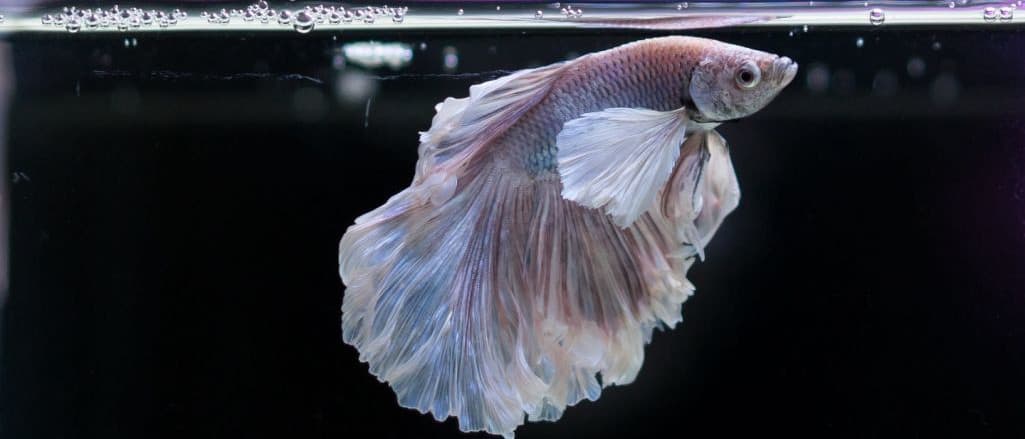3 Reasons Why Your Betta Fish is Turning White or Losing Color
Bettas come in all kinds of vibrant and vivid colors, from sunburst oranges to deep reds and blues. This is why it can be so distressing for an owner to watch their beautiful fish lose its color and splendor.
There are a number of possible reasons why a fish may start to lose its color, and in this comprehensive article I will discuss all possible reasons and potential cures.
Hopefully, if you apply the advice given in this article, then you should be able to correctly diagnose the cause of the sudden change and get some easily applied solutions.
There are a few different ways that bettas can lose color, but in this article I will focus exclusively on bettas that turn white. Other bettas may turn black (or some more exotic color) which could be an issue but will not be covered here.
So, if you notice a problem with your beloved betta starting to turn white, and asked yourself, why is my betta fish turning white/losing color, then you’ve come to the right place.
Table of Contents
3 Reasons Why Your Betta Fish Is Turning White Or Losing Color
As eluded to earlier, there is a huge variety of different reasons why your betta fish may be losing color.
In the majority of circumstances, the causes can be grouped into three categories; natural aging, stress and illness. I will deal with each of these distinct categories in turn.
1. Natural Aging
Video: “How to Care for Your Elderly Betta Fish”
Like the old saying goes, all good things must come to an end. Betta fish have a finite lifespan, and in their twilight years their general health is likely to decline. There isn’t much you can do about this, and it often manifests in loss of color in the fish.
If you keep the tank conditions clean and healthy then you can expect your betta to live to be about 5 years.
Unfortunately, in the last year their color is likely to diminish, as will their mobility and general energy levels.
You can help keep this natural aging process at bay for as long as possible by feeding them healthy food and keeping the tank clean, but the aging process cannot be prevented forever.
2. Stress
It is well known that fish will display their colors most vividly when they feel secure and comfortable and are not distressed.
In fact, color is usually the most efficient gauge of the general health and well-being of your fish. Betta fish are no exception. This is most likely a remnant of the evolutionary process.
In the wild, the less confidant, more stressed fish will not want to stand out from the crowd.
As a result, they adapt by displaying dull, bland colors that allow them to blend into the background.
This helps them to avoid the wandering gaze of other predators, or even larger fish that are likely to bully them.
However, if the fish is placed in an environment with no natural predators or threats (such as an artificial aquarium) then there should be no real sources of stress. In this case the fish should display vivid colors.
Stress is likely to effect much more than just the color of your fish, so you should not ignore it. It may affect their behavior, their feeding routine, their energy reserves and their immunity and ability to fight off diseases.
This is why you should not overlook a sudden (or even gradual) change in color. It can be an indicator of a much more serious underlying problem.
3. Illness
When people ask the question, why is my betta fish turning white or losing color? many people immediately assume it is caused by an illness.
Indeed, this is sometimes, but not always, the case. Loss of color can be a symptom of a wide range of diseases or afflictions in the aquatic world, and betta fish are susceptible to their fair share of them.
In this section I will go through some of the more common illnesses that can lead to this outcome, discussing their causes and effects.
It is important to realize that some of these illnesses may require veterinary advice, and if you are very worried then you should definitely consult a qualified expert.
Columnaris
Video: “Columnaris: The Deadly Freshwater Disease”
One such illness that betta fish can suffer from is columnaris. Columnaris is also known as cotton-mouth and it is an illness brought on by a bacterial infection. Unfortunately, this is a highly contagious disease that afflicts many species of freshwater fish.
It is very commonly found in artificial aquatic ecosystems, such as breeding ponds or tanks. It can cause fluffy white spots to appear on the body of your betta. Unfortunately, this is not the only effect. It can also cause ulcers or fraying of the fins.
It is a real attack on the whole body and general health of the fish, and the end results can often be fatal. So, if you find these symptoms appearing on your beloved betta then you should act quickly.
Anchor Worms
Video: “Recognizing Anchor Worm and Removing It From Freshwater Fish”
Another illness that may cause loss of color is anchor worms. These are tiny worms that can attach themselves to the surface of the skin, burying their heads through the skin, and live as parasites on the betta.
This can be greatly decreasing the strength, immunity and general health of the betta.
These worms are often whitish in color, and from afar they may just look like patches of white on the skin, but you should recognize this as a much more deadly assault than just natural aging.
Fin Rot
Video: ” Betta Fish Fin Rot Cure / Treatment”
Fin rot is another process that can cause your betta to lose its distinctive color.
As the name suggests, this is an inconvenient illness which can also cause fraying or general damage of the fins or other appendages of a fish. It can also show through lethargic behavior or change in feeding patterns.
The loss of color will first appear on your betta’s fins in the case of fin rot, but if left untreated it may quickly migrate to the main body of the fish.
Unfortunately, this affliction can often result in the death of a fish.
How to Use Aquarium Salt for Freshwater Fish
What Can I Do About My Betta’s Loss Of Color?

Just as there are a myriad of potential causes to color loss in a betta, there are many diverse solutions.
First of all, if you determine that your fish is afflicted with an illness, such as one of the types described above. Then it is important to treat the root cause.
This may necessitate a trip to the vet, or the use of special medication. There may also be special chemical treatments available to help cure your betta.
For the other types of color loss, there are some general rules that everyone can follow to keep their betta looking prim and proper.
For example, keeping your water clean and keeping the water chemistry in balance is extremely important. Not only will this lower the stress levels and improve the general health of your fish, but it can also help them keep their color for longer.
Good biological filtration will ensure that the toxic wastes are reduced to low levels, and the pH remains in the safe zone. If the pH or ammonia levels move out of spec this can cause great distress to your betta and may lead to color loss.
It is also extremely important that you perform very regular water changes of your tank, for the same reason.
Some brands of fish food are also specially formulated to help enhance the color of your fish.
Feeding these kinds of fish food, which are often rich in protein, salmon and other nutrients, can have a very beneficial effect on their overall appearance, although they might be a bit more expensive.
Best Betta Fish Food – Healthy + Colorful Betta
How To Clean A Betta Fish Tank – 12 Step Guide
Conclusion
If you have ever wondered, why is my betta fish turning white (losing color), then hopefully this article has provided some possible answers.
There are three primary causes, including natural aging, stress and illness. One of these causes (aging), you can do little about, but there are actions you can take to help alleviate the other two problems.
You should observe your betta fish very closely to try and diagnose an illness. Often there are many contributing factors and other symptoms to look at.
Some of the remedies are easier than others, but in the case of illness it is important to tackle the underlying cause.
There are some general preventative measures that you can take to reduce the risk of color loss. This includes good filtration and regular cleaning, as well as water changes and feeding them a color enhancing diet.
If you follow this advice, then your betta should remain color-filled and be a source of joy for you for years tom come.
7 Best Filter For Betta Tank Reviewed




